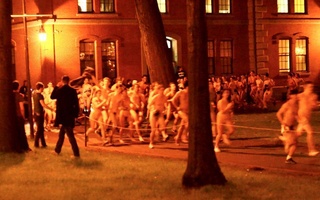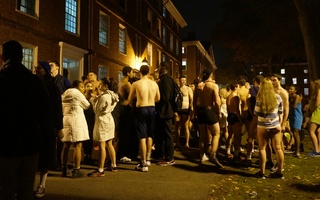A little under a year ago, a mass of drunken undergraduates and I, with more reading period burdens on our shoulders than clothes on our backs, gathered in Harvard Yard for the notorious, biannual Primal Scream to commemorate the start of final exams. We were joined on this freezing, rainy night by a crowd of Black Lives Matter protesters carrying signs and chanting words that I no longer recall. The protesters called for a period of silence just prior to the start of the Scream to honor the death of Michael Brown, a call that went unanswered as the clock struck midnight and the runners, in lieu of stampeding over the protesters standing in the path of the usual counterclockwise lap around the Yard, turned to run unhindered in the opposite direction.
In the hours and days following, sentiments were expressed interpersonally and over social media about the insensitive nature of the Screamers who collectively chose to run instead of agreeing to the moment of silence. Specifically, the image of the white runners evading and thus delegitimizing the black protesters’ cause was at the forefront of the scrutiny. The white students involved were called out as a whole for their inaction.
On some level, I felt personally attacked for having unintentionally been a part of something so upsetting. After all, in the confusion, I hadn’t known what the protesters were asking for that night. I hadn’t been aware that they were going to be present at the Scream at all. I wanted to make it publicly known that I, a white person, hadn’t wanted to contribute to something that pained my peers of color so deeply. Feeling distraught, I took to Facebook to apologize for the way things had gone via a ridiculously long status.
I had good intentions. But I was missing the point.
You see, there’s a very specific dynamic surrounding the discussion of privileged-underprivileged dichotomies like that of the Black Lives Matter movement. It’s the same dynamic that accompanies the messed up dance of #notallmen and #yesallwomen, or the backlash that as a queer person I tend to receive when I say things like, “Straight people are the worst.”
When a privileged monolith is called out for its role in systematic, sociopolitical imbalances, it stings on the individual level.
In other words, when “all” of any majority group are held responsible for something, its members cry out in protest, insisting that while they may be part of a problematic group, they are not themselves the problem. The real culprits, they declare, are just “some” of them.
And there is real merit to this argument. I don’t think anyone could logically argue that every white person is equally to blame for the institutional racism sewn into our country’s skin. Nor would one insist that every man is responsible for the culture of misogyny and rape that disadvantages all women. Nor still does one believe that every straight person equally perpetuates homophobia.
So why do we call out people on the level of “all,” when the problem exists only in “some?”
There are at least three prominent reasons. Firstly, and very simply, there does not, and likely cannot, exist a filter with which to separate the problematic people from the helpful. To use language like “some” when discussing matters for which people must take responsibility, like when dealing with racially disadvantageous systems, creates an automatic hole in the screen through which the most ignorant culprits can slip, claiming, “Well, I’M not the problem,” when they actually are. Leaving this hole open gives more blatant bigots the power to maintain their bigotry. One says, “some,” they hear, “others.”
Further, the degree to which any person is “problematic” is not black and white, but rather quite nuanced. Even allies, those less compliant in the actions of their monoliths, may accidentally create problems without realizing it. This was my downfall when taking to Facebook to profess my deep regret for my part in the Primal Scream fiasco: I was so concerned with clearing my white name that I forgot to remember the black cause. I wanted too badly to remind everyone that I was an ally, and in doing so I momentarily stopped being one. I turned the lens on myself when it wasn’t meant to be there.
Finally, there is no denying that whether or not one personally contributes to institutional racism, it’s a problem that all people of color face. Whether or not any one man contributes to a sexist society, all women are forced to fight back against it. And whether or not a straight person directly or inadvertently perpetuates homophobia, they still benefit from a heteronormative society in a way that no queer person does. The underprivileged do not get the luxury of identifying with something other than “all,” so neither, then, should their privileged counterparts.
So what’s the takeaway? Being an ally and acknowledging your role as part of the “all” is crucial to the demarginalization of minority groups. But it’s not about being sorry, or being a hero with a clear, elevated conscience. It’s about understanding that you’re part of a larger problem, whether or not—and regardless of how severely—you contribute to it. It’s about supporting those fighting against oppression without turning the focus on yourself. And that’s the point that I was missing after Primal Scream. I write about it here in the hopes that readers may become as hot and bothered as I have on the matter, and that they may take a step back and acknowledge that those who must take responsibility for and action against injustice are not the “some”, but indeed the sum, of a majority group’s parts.
Kyle R. Whelihan ’17, is a psychology concentrator living in Mather House. His column appears on alternate Wednesdays.
Read more in Opinion
The Scandal of Harvard's Bad ArgumentsRecommended Articles
-
A Vision of the FutureThis was supposed to be a column about my first experience with streaking last week, sprinting stark naked at midnight
-
Why I Run (Naked)I look back now on my four years at Harvard with both fondness and regret. I’ve made some great friends
-
 Spring Primal Scream or Nah
Spring Primal Scream or Nah -
 Sprinting in the Buff, Students Mark the Start of Finals
Sprinting in the Buff, Students Mark the Start of Finals -
 Slippery and Streaking, Primal Scream Runners Storm Yard
Slippery and Streaking, Primal Scream Runners Storm Yard













